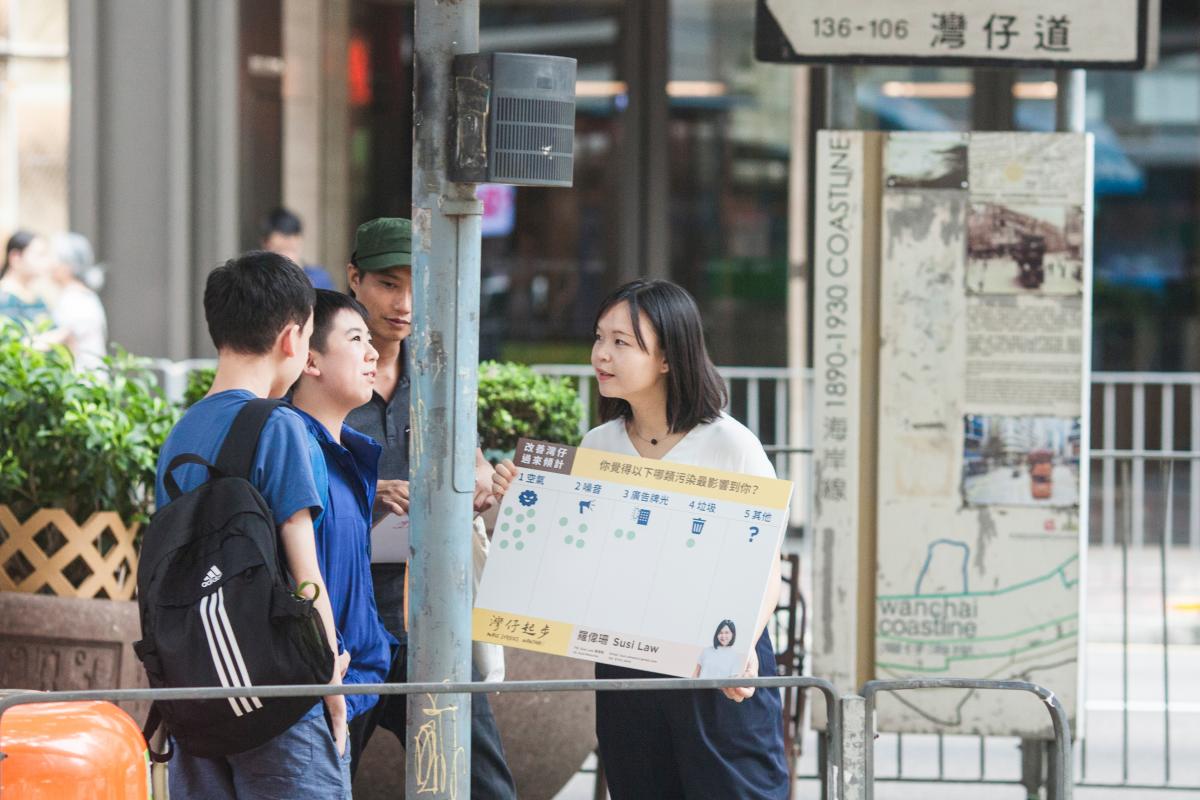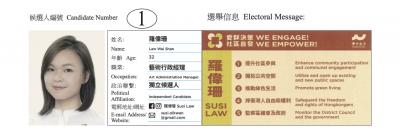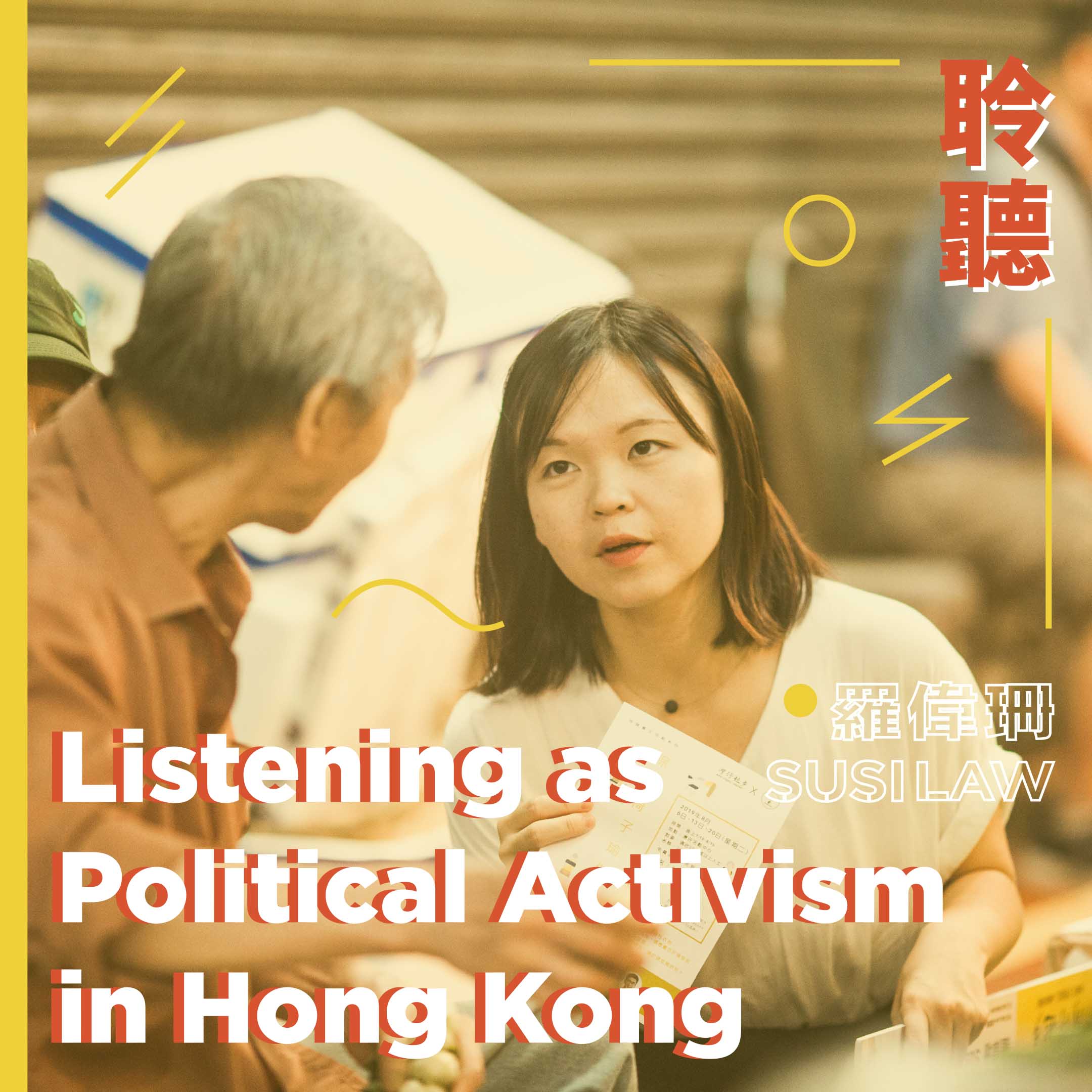
Listening as Political Activism in Hong Kong
Since the 2014 Umbrella Movement, Hong Kong’s art and music industries have been baptized by a political awakening. Creatives like Kacey Wong and Denise Ho rebel against the pro-Beijing establishment, and now a number of artists got elected into district councils (Chow 2019). Among them, Susi Law stands out with a passion for listening and sounds. She is not one for big speeches or loud campaigning. Instead, she is a city explorer, a curious stroller. In this commentary, I want to point out how her aural sensitivity could be beneficial to Hong Kong’s political crisis in 2020.
Conducting fieldwork about soundscapes in Hong Kong’s vertically densified urban spaces, I followed Susi Law in her daily listening routine. On election day, as well as the days before and after, I spent hours with her and other volunteers campaigning, distributing flyers, chanting slogans. It was a humbling experience. The city, after months of protests filled with suspicion and anger, was a hostile place. We were verbally harassed and people tried to frighten us. One evening a triad member snapped a shot with his phone and told Susi Law: «This is your last picture.» But while her opponent from the DAB (Democratic Alliance for the Betterment and Progress of Hong Kong) had a car with a loudspeaker broadcasting his pre-recorded slogans on election day, Susi Law held out in her neighborhood.

Campaigning by Listening
This encounter with the residents of Hong Kong comes with a vulnerability that seems to open our senses to the environment. Active listening in the neighborhood is a grassroots alternative to the top down politics of an establishment that builds expensive musical fountains (Cheng 2019) instead of asking what people really need. Susi Law and her team kept smiling, her voice only amplified by a small portable speaker, often not even in use when engaged in person to person conversation. Her strategy was direct contact, she was literally trying to convince each of the 6181 electorates of the constituency to vote for her, and she won by 57% (Wikipedia 2019). Law’s campaign included boards where people could share their thoughts with post-its, yet another variation on the ubiquitous Lennon-walls in Hong Kong as a manifestation of free speech.

In her brochure, Law writes: «I like chatting. I love listening. Listening makes me learn and grow. Wan-Chai-ers (inhabitants of the Wan Chai neighborhood), please allow me to be your listener.» Having studied with sound-scholar Brandon LaBelle at the Bergen Academy of Art and Design, Susi Law exhibits a sensitivity for soundscapes that helps to understand some of the challenges of urban planning and improve the living conditions in her district.
Listening Against Authoritarianism
As Susi Law’s success in the election seems to prove, listening could become a key asset for politicians to ease people’s doubts during this time of mistrust in governments and elites. Listening means embracing the contradictions, opposing opinions, both praise and criticism, pleasant as well as unpleasant sounds. While those who speak divide into pro and contra, those who listen potentially include every opinion. Listening can be democratic, and therefore an adequate strategy to challenge authoritarian forces. Listening itself is a performance of Bruce Lee’s famous «be water» principle, that inspired the tactics of ephemeral civil disobedience in Hong Kong (Hale 2019). It is unobtrusive, yet effective.
Field Recordings from the Streets of Hong Kong
Prerecorded slogans of the DAB candidate. Amplified by a megaphone speaker located on an SUV that drove through the neighborhood. Recorded on Sunday, 24. November 2019 at 2:35 p.m. on Johnston Road in Wan Chai, Hong Kong.
Volunteers spreading flyers and encouraging pedestrians to vote for Susi Law. Recorded on Sunday, 24. November 2019 at 4:05 p.m. on Hennessy Road in Wan Chai, Hong Kong.
After a long campaigning day and painful hours of waiting during the counting of votes the results are finally announced. Recorded on Monday, 25. November 2019 at 00:54 a.m. in the Oi Kwan District Polling Station in Wan Chai, Hong Kong.
In the week after the election Susi Law went again to the streets to thank the neighbors for their votes. Recorded on Tuesday, 26. November 2019 at 5:34 p.m. at the intersection of Wan Chai Road and Johnston Road in Wan Chai, Hong Kong.
List of References
This commentary has been written in the context of the international workshop «Sound in Motion» at the University of Bern in September 2019.
Biography
Published on January 07, 2020
Last updated on April 02, 2024
Topics
Why do people in Karachi yell rather than talk and how does the sound of Dakar or Luanda affect music production?
Why New Yorks’ underground doesn’t give a fuck about Trump or why satirical rap in Pakistan can be life threatening.
A generative practice that promotes different knowledge. One that listens is never at a distance but always in the middle of the sound heard.
How do acoustic environments affect human life? In which way can a city entail sounds of repression?
Snap

